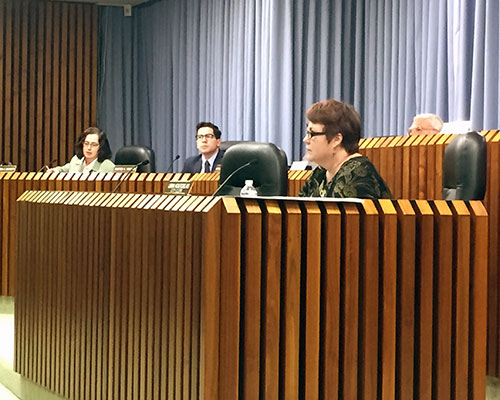City Council Still Wants State Legislative Help
Haverhill city councilors and management from a local agency operating group homes for troubled youth both seek new reforms to state “child in need of services” (CHINS) regulations to help stem juvenile runaway calls to police.
All eight councilors present Tuesday approved a “three-part motion by Councilor Joseph J. Bevilacqua to send letters to local lawmakers asking they review a 2012 reform of an existing CHINS or “child requiring assistance” (CRA) law, Department of Children and Families (DCF) expressing the council’s “hope to see improvements” and to have group home management and police give a progress update in two to three months. The council action came after discussion, requested by Bevilacqua, with representatives from services agency NFI Massachusetts. The former Team Coordinating Agency operates two group homes on South Kimball Street. NFI Deputy Director Lydia Todd and Director of Behavioral Health Christopher Tuttle spoke of work with Haverhill police and putting a new “runaway” policy in place several weeks ago. A new, three-tiered policy, according to Tuttle, is based on a level of risk for youth residents who either “leave the program, run from school or leave from time at home or a job, or don’t return to the group home at a scheduled time.”
“If they’re not back at a scheduled time, or if they leave the premise and we don’t feel they’re a danger, we are waiting two hours before we notify the Haverhill Police Department. In those two hours, we have already contacted DCF, we have contacted any family members and a staffer actively looking for the kids who have left. Often times when kids leave they’re feeling upset, they’re angry, they’re disregulated. Our staff track kids for wherever they are going. We’ve had staff walk literally miles with kids to engage them, get them back into the program,” Tuttle said.
“There’s about 95 percent of the CRA new law that really is effective and good. Running is not a criminal offense nor should it ever be a criminal. But there were certain things taken out of the CHINS law that really do hamper our ability to help and manage and work with these kids. So I would say any help we can provide the city council on this topic, we’re more than willing to do. But I think the help we would need is bringing it to whoever, groups or connections and people you work with at the state level,” Tuttle added.
Todd added the new policy has “dramatically dropped off” the frequency of runaway calls to police.
“And if you’ve got kids that are running away on a daily basis to go smoke a cigarette, which we don’t allow in the programs, it seems kind of an excessive demand on the police to have to come and take a report after 20 minutes. And then the child returns again after an hour and maybe runs again in four hours and returns. So kids, who we know what they’re up to or they’re very low risk of harm to themselves or the community, we can give them a larger window of time,” Todd said.
Group home neighbor Steve Goss, 35 South Kimball St., also told councilors NFI has been working with neighbors to make the neighborhood “a lot quieter,” such as the removal of one juvenile who allegedly was breaking windows nearby.
“Mr. Tuttle, he reached out to the neighbors, he talked to us. Some of them were not very receptive but we have to remember this is a statewide issue. And every community – Malden, Medford, all these small cities – the only thing we can say is ‘go back to the legislature, talk about reform, talk about how they’re going to do it. Eventually what’s going to happen is it’s going to burst out at seams,” Goss said.
Goss also contended “publicity” from other council-related issues on South Kimball Street, including speeding and odors from a septic service facility, would negatively affect property values.
Councilor Colin F. LePage was absent.

